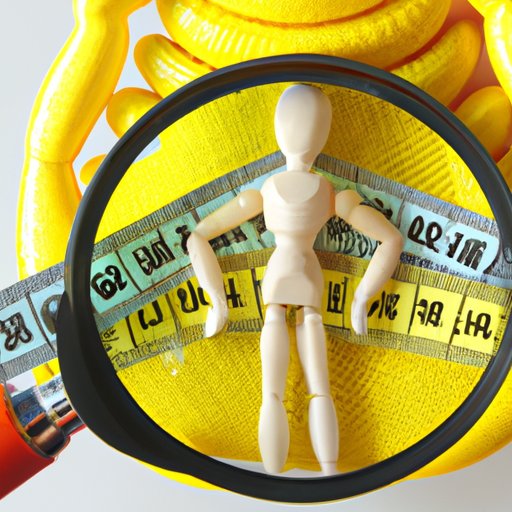
I. Introduction
Unintentional weight loss is a common side effect of cancer and can have a significant impact on a patient’s health and wellbeing. It can be distressing for patients and their families alike. Understanding the factors that cause weight loss, as well as exploring strategies for maintaining a healthy weight during and after cancer treatment, is essential to overall care. In this article, we aim to explore why cancer patients experience weight loss, its relationship with cancer and cancer treatments, the role of nutrition, various coping strategies, the psychological impact, and alternative therapies.
II. Understanding the Relationship Between Cancer and Weight Loss
The relationship between cancer and weight loss is complex and involves several factors ranging from cancer type, stage, and treatment. Some common causes include a reduction in muscle mass, an increase in metabolic demands, a decrease in appetite, and hormonal changes. Because cancer cells grow rapidly, the body expends more energy to fight them, and the increased metabolic demand can cause weight loss. Weight loss can also be a side effect of cancer treatment, including chemotherapy, radiation therapy, surgery, and immunotherapy.
III. The Role of Diet in Cancer Treatment
Nutrition plays a crucial role in cancer treatment. Patients undergoing treatment require a balanced diet to provide them with adequate nutrients and help maintain optimal weight. However, cancer treatments can impact appetite and digestion, making it difficult for patients to eat and maintain adequate nutrition. To counteract this, it’s essential to adjust one’s diet and incorporate easy-to-digest foods that are high in protein, vitamins, and minerals. Eating smaller, more frequent meals, supplementing meals with high-calorie snacks, and staying hydrated can also help increase energy levels.
IV. Maintaining a Healthy Weight During and After Cancer Treatment
Maintaining a healthy weight during and after cancer treatment is critical to improve patient outcomes. Patients who lose too much weight are more likely to experience negative effects of cancer treatment, such as fatigue, muscle wasting, and decreased quality of life. Practical tips for maintaining a healthy diet and exercise regimen during and after treatment include staying hydrated, eating a healthy, balanced diet, and engaging in light to moderate exercise. Strategies for managing weight after cancer treatment include practicing mindful eating, keeping track of portions, and staying active.
V. The Psychological Impact of Cancer-Related Weight Loss
Cancer and weight loss can have profound psychological effects on patients, their families, and caregivers. Cancer patients who experience weight loss may feel isolation, anxiety, frustration, and depression. In turn, these psychological symptoms can cause patients to lose more weight. Coping strategies for managing anxiety and depression include practicing relaxation techniques, engaging in regular exercise, seeking support from mental health professionals, and joining support groups.
VI. Supporting Loved Ones with Cancer-Related Weight Loss
Caregivers face unique challenges when it comes to supporting loved ones with cancer-related weight loss. Providing emotional support can be as simple as listening to concerns, offering comfort, and showing compassion. Assisting with meal preparation and planning by incorporating nutrient-dense, flavorful meals is also essential in maintaining adequate nutrition.
VII. Alternative Therapies for Cancer-Related Weight Loss
Alternative therapies may offer patients additional support in managing cancer-related weight loss, but it’s important to discuss these treatments with a medical professional. Complementary therapies such as acupuncture, massage, and herbal remedies can improve symptoms such as nausea and fatigue. Exercise and yoga may also offer benefits in terms of increasing physical activity, decreasing fatigue symptoms, and improving overall health outcomes.
VIII. Advocating for Better Cancer Care
Better cancer care and treatment are central to improving patients’ outcomes with cancer-related weight loss. Nutritional counseling and support services during cancer treatment can make a significant difference in patient outcomes. Advocating for increased access to these services and innovation in cancer treatment is essential.
IX. Conclusion
Unintentional weight loss in cancer patients is a common and challenging symptom that can impact their health, wellbeing, and quality of life. It’s crucial for patients and caregivers to understand the relationship between cancer and weight loss, the role of nutrition, coping strategies for managing the psychological impact, alternative therapies, and advocacy for better cancer care. Addressing cancer-related weight loss through a multifaceted and integrative approach can help patients maintain their health and wellbeing during and after treatment.




